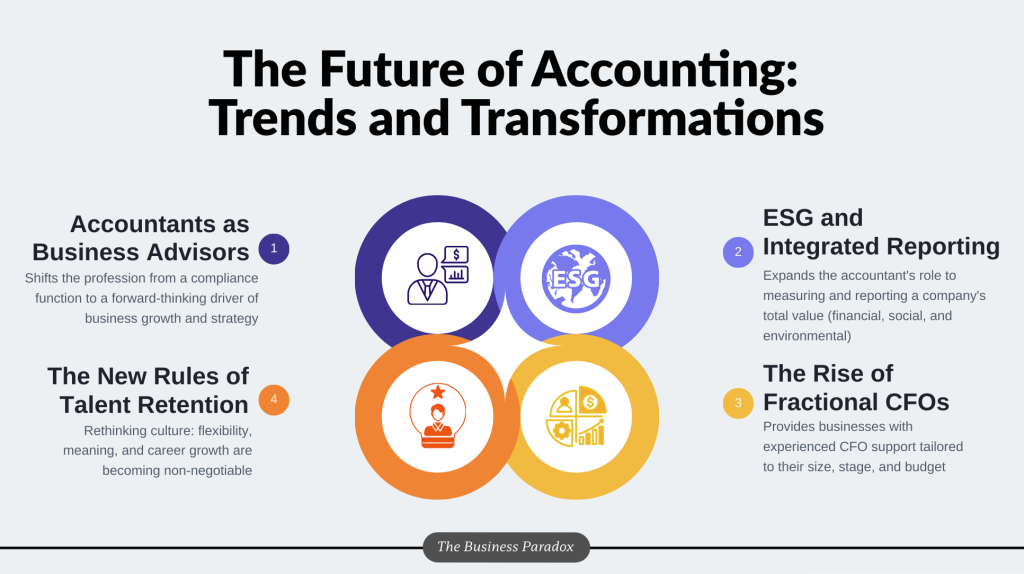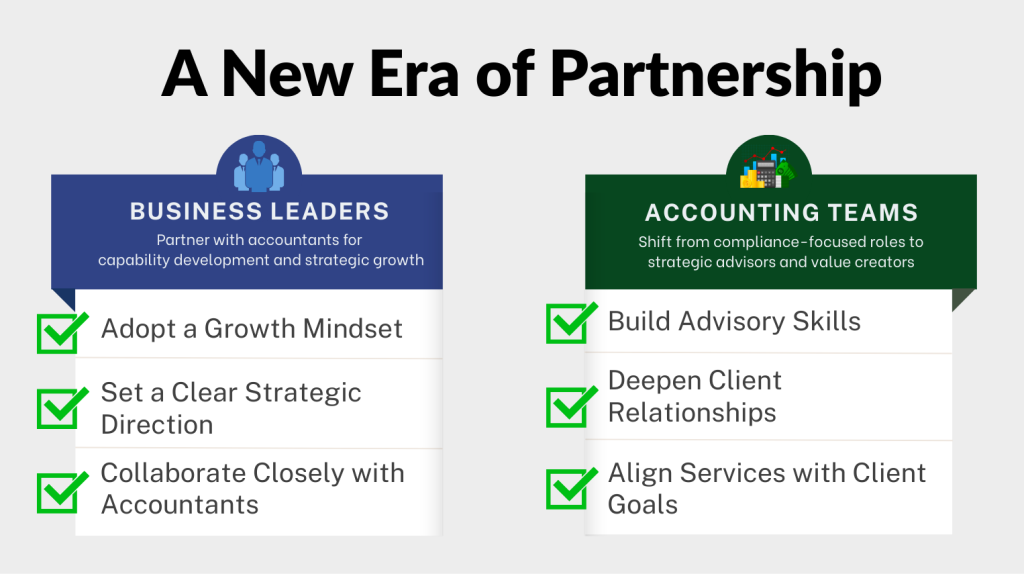What’s Next for Accounting? Key Shifts Defining the Next Decade
Accounting has long been seen as a stable profession, but that image no longer holds. Similar to other industries, it is being reshaped by automation, artificial intelligence (AI), evolving regulatory frameworks, and shifting client expectations. The accounting field is being reshaped by four major trends, impacting how accountants work and the value they provide.
Firstly, accountants are increasingly stepping into the role of strategic business advisors. The automation of repetitive and low-skill tasks enables accountants to take on more analytical and strategic responsibilities. As leaders face increasingly complex decisions, accountants are becoming partners in guiding long-term strategy. At the same time, emphasis on sustainability and integrated reporting is pushing companies to expand their definition of success. Accountants are now at the forefront of measuring and communicating environmental, social, and governance (ESG) metrics. Their new task involves making sense of non-financial data so leaders, investors, and regulators can make better decisions.
In addition, the rise of fractional CFO services is transforming financial leadership for small and medium-sized businesses. For many companies, engaging a part-time CFO is a cost-effective way to gain senior-level financial leadership. For finance professionals, this trend is opening new career paths and ways of working. Finally, talent retention has become a strategic imperative. In a competitive hiring landscape, companies need to rethink how they attract and retain top talent. This could mean investing in meaningful career development, flexible work arrangements, and technology that automates routine tasks and frees up teams to focus on high-impact work.

These trends signal a fundamental shift in the accounting field and the role of the accountant is no longer confined to compliance and reporting. Today, they are strategic leaders who help drive innovation and growth. In this new era, the accounting and finance team play a more agile, consultative role and they are central to strategic decision-making.
Accountants as Key Business Advisors
Technology is fundamentally reshaping the role of an accountant by automating routine tasks. Tools such as AI, robotic process automation (RPA), and cloud-based analytics platforms are streamlining processes like book keeping and invoice processing. Accounting firms are now evolving into advisory businesses where their value is measured by strategic, data-driven advice. As compliance tasks become increasingly automated, the value of an accountant lies in their skills that machines cannot replicate, which includes emotional intelligence, communication, and change management. By eliminating the need to spend time on low-skill, repetitive tasks, these changes allow accountants to deliver actionable insights and align more closely with clients’ strategic goals.
Business leaders want to understand what the financial statements reveal about operational performance, risks, and growth opportunities. This is where accountants play a critical role since they are uniquely positioned to interpret the numbers, connect them to broader business goals, and provide forward-looking guidance. All this can help leaders make smarter decisions, allocate resources more effectively, and steer their organisation toward sustainable growth.
At the core of this transition is the accountant’s ability to build strong, trust-based relationships through a deep understanding of each client’s business. With more time to talk to clients, accountants better understand clients’ needs and challenges, enabling them to provide valuable guidance on risk management or growth strategies. This transforms their role from a routine service provider into a trusted advisor, benefiting both client and professional. In today’s business landscape, the value of an accountant no longer lies in their technical expertise, but in their ability to connect, collaborate, and align with a client’s long-term goals.

Building on their new role as strategic advisors, accountants are now at the forefront of another major trend: sustainability and integrated reporting. This is where they guide businesses on measuring and disclosing their non-financial impact. What used to be an added bonus is now a business necessity, due to evolving regulations and stakeholder demands. Accountants are now responsible for collecting, analysing, and reporting non-financial metrics such as carbon emissions, social impact, and governance practices. Their role now includes showing how a company’s finances connect to its ESG goals and future growth.
The Responsibilities of Accountants in ESG
1. Data Collection & Assurance:
Accountants must now embed ESG data into the systems used for financial reporting. This ensures consistency, reliability, and audit-readiness. As companies include more non-financial information in their annual reports, the need for verifying ESG data is increasing. Certified Public Accountants (CPAs) are often responsible for checking this information, which builds trust and transparency for investors and regulators.
2. Materiality Assessment:
Determining which ESG issues matter most is now a key part of the accountant’s role. They lead structured materiality assessments and apply frameworks like Global Reporting Initiative (GRI) and Sustainability Accounting Standards Board (SASB) to identify the ESG factors that are financially significant. This process ensures reporting is focused, relevant, and aligned with business strategy.
3. Regulatory Compliance:
With new global standards such as the EU’s European Sustainability Reporting Standards (ESRS), accountants are responsible for aligning corporate disclosures with evolving frameworks. This promotes standardisation, facilitates comparison, and ensures regulatory compliance, which stakeholders now expect.
The Rise of the Fractional CFO
The move toward integrated reporting is one example of how firms are adapting to new demands. In a similar vein, the rise of the fractional CFO demonstrates another major shift. The growing popularity of fractional CFO services is a direct response to the need for agile, expert support in today’s fast-paced market. It allows companies to gain high-level financial insight without the commitment of a full-time executive. This is especially attractive for startups and scaling companies that need strategic guidance but do not want a permanent CFO. A fractional CFO brings objectivity, experience, and a forward-looking perspective that internal teams often lack the bandwidth or expertise to provide.
Fractional CFOs are not temporary hires or simply part of cost-saving measures. They are external strategists who can help drive business forward. They bring cross-industry experience, allowing them to spot trends, uncover risks, and identify untapped opportunities. Free from internal bias or daily distractions, they offer an clear view of the company’s financial health and future potential. This fresh perspective enables leaders to move from reactive financial management to proactive decision-making.
The rise of fractional CFOs does not replace internal accounting teams. To make the most of this model, internal teams must:
1. Focus on data integrity: Clean, reliable financial data is the foundation for strategic insight. Automation and cloud-based systems help reduce errors and free up time for deeper analysis.
2. Adopt a collaborative mindset: Accountants shift from record-keepers to strategic collaborators, working closely with the fractional CFO to align day-to-day operations with long-term business goals.
3. Invest in new skills: Teams must evolve their capabilities to develop fluency in data analysis, financial storytelling, and cross-functional communication.
The rise of fractional CFOs reflects a broader shift toward flexible financial leadership. Businesses no longer need to follow a one-size-fits-all model, and they can bring in specific expertise as needed, tailored to their size, stage, and goals. The next chapter for accounting and finance is about being responsive, delivering meaningful insights, and supporting businesses through unpredictable challenges.
How To Attract and Retain Talent in Today’s Market?
Just as businesses seek flexible financial leadership, today’s finance professionals want the same agility and purpose in their careers. The accounting profession is facing a talent crisis where long-held traditions of work-life imbalance are causing high turnover and pushing professionals away. Many young accountants are frustrated with routine, repetitive work and seek meaningful jobs that involve new technology. When firms fail to provide a clear roadmap for career growth, individuals feel stagnant and seek opportunities elsewhere. This challenge is heightened by intense competition from other industries. Accounting firms are losing top talent to sectors like tech and consulting, where there are flexible hours, advanced tools, and dynamic company cultures.
To attract and retain top talent, firms must bridge the gap between their offerings and what employees actually value. It’s not enough to rely solely on high salaries and recruitment messages should focus on a positive workplace culture, professional fulfillment, and opportunities for continuous career growth. For smaller firms, who may not be able to match the pay of larger competitors, the key is to highlight strengths like flexibility, remote work options, and purpose-driven work.
To build a resilient and engaged team, leaders should invest in creating a learning-rich environment. This means developing mentoring programs, formal training, and clear development plans. By offering a clear path for advancement, firms can drastically reduce turnover and position themselves to meet the evolving demands of modern accounting. Companies are being forced to move away from rigid, traditional structures and adopt more people-centered practices that reflect the evolving expectations of today’s workforce.
Conclusion: A New Era for the Accounting Profession
The future of accounting is shaped by a deep, interconnected transformation. Technology, evolving client expectations, and a generational shift in workforce values are pushing the profession well beyond its traditional boundaries.
From the rise of advisory-focused roles and the integration of ESG and sustainability reporting, to the growing demand for fractional CFOs and the urgent need to attract and retain top talent, these changes are reshaping the profession from the inside out. Together, they signal a new era where accountants create value by guiding decisions that shape the future.
Companies that embrace technology, foster learning-rich cultures, and cultivate strategic, relationship-driven skills will lead the profession forward. The path ahead is clear: accounting is no longer just about numbers. It’s about knowing how to translate financial expertise into tangible business value.
Stay ahead with exclusive insights! Sign up for our mailing list and never miss an article. Be the first to discover inspiring stories, valuable insights and expert tips – straight to your inbox!




